Chasing the White Ball
Uemura Chika
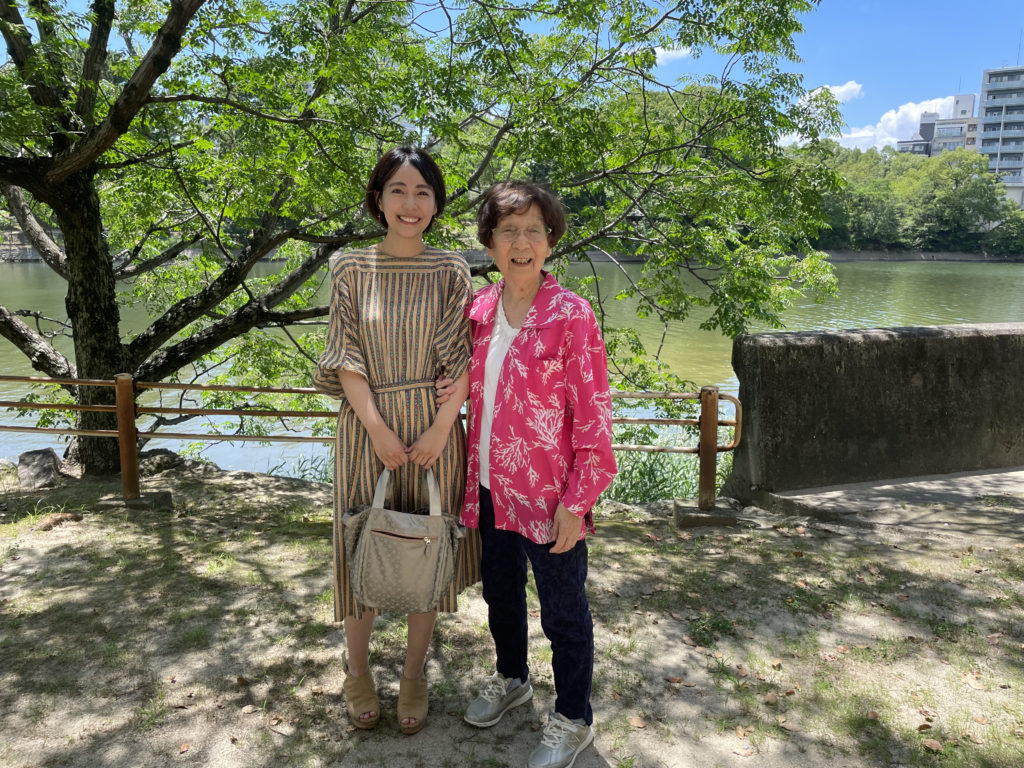
August 6th.
It’s a special day for Japan.
And an unforgettable one for Hiroshima.
At 8:15 a.m., the sirens’ blares fill the city—a silent prayer that sounds every year. I remember feeling a bit off when I went to Tokyo. Where were the sirens?
My grandmother was fifteen during the atomic bombing. She was heading to her girls’ school when the tragedy struck her. In other words, I’m a third-generation atomic bomb survivor. For those who have never experienced it, this may feel like a distant story from another world. However, I believe this story is actually a lot closer to us than it seems.
Still, this story frightened me as a little girl, discouraging me from learning more. I came to regret this decision when I grew up and heard about the tragedy’s events again. Why didn’t I listen sooner?
And so, I started listening more and more to my grandmother’s tale, writing down her actions that day in detail.
What you are about to read is a recollection of what happened to my grandmother Kazue on August 6th.
Grandmother’s Recollection
August 6th, 1945.
It was a clear blue sky with not a single cloud in sight. A girl in a sailor uniform and work pants was rubbing her sleepy eyes while heading to her classmate’s house.
Several air raid warnings and advisories had been issued since last night. The alert was still in effect at 7:09 a.m. but was lifted at 7:31.
Over eight hundred Yasuda Girls’ High School students were called to labor that day. Most of her classmates were mobilized. Some had urgent work at the Ohashi Plant, some at Homare Aircraft Factory, Takamitsu Machine Works, and Koamitsu Needle Works, and others in the Nakajima area. She, too, was sent to a munitions factory for a few months. However, she failed a blood test midway and was demobilized as a frail student needing protection. Sent back to school, the fifteen-year-old Kazue was now part of the “stay-behind” group. It was when girls who weren’t even physically weak started dropping out of work due to malnutrition caused by hard labor and inadequate food supplies. There were a little over sixty people in Kazue’s group. They were uneasy about returning to school while everyone else was working. They still had assignments, though, such as plowing the potato field they had built on the school’s sports grounds and cleaning the Izumi Residence (now Shukkeien Garden).
It was 8 a.m. when Kazue dropped by her classmate’s house along the Enko River from Hiroshima Station on her way to school. Kazue wanted to go to school with her together. Her friend lived in a two-story mansion with an organ inside. It was the residence of the Chikuta family of Chikuta Sanjuen, an ume extract seller famous in the area. Kazue’s classmate, Umemoto Miwako, moved there with her elder sister, who married into the Chikuta family.
“Good morning, Kazue. Terue’s already here.”
Miwako’s family invited Kazue and Uzumaki Terue to wait upstairs while she was getting ready. They sat on chairs by the window. Kazue liked the organ. It majestically sat there in the room as if it were its master. As usual, Kazue gazed at the organ while waiting for Miwako. Her back was to the window. Little did she know that this simple posture would make the difference between life and death.
8:15
A yellow light suddenly filled her vision.
She had no time to process it. The next thing she knew, a roaring impact rammed through her. Everything went dark. The roof collapsed in an instant, pinning her under.
When she came to, all she could see was wreckage. What was once the roof and pillars had turned into burnt timbers, countless rubbles piling atop each other. Smoke painted the once-blue sky black like someone had flipped the switch from day to night.
Kazue was stupefied. Her world had turned upside down in a mere instant. Countless pieces of glass had pierced her back. Her skin was sore from legs to fingers, reddish-black and swollen as if they weren’t hers. Frightened, Kazue crawled out of the debris and saw a girl in a sailor uniform standing there with a face puffed up like a balloon.
“Who’re you?”
Kazue gasped after uttering those words.
It was Miwako, the same girl loved for her fair skin and pretty features. This happened about 1.5 kilometers from the hypocenter.
Dumbfounded, Kazue went outside. All the buildings had collapsed, reduced to piles of rubble. A strange smell pervaded the air—one she never encountered before.
“We should get to the East Parade Ground.”
Kazue, Terue, and the Chikuta family limped to the East Parade Ground, about a kilometer behind Hiroshima Station. The city was in flames, and the sound of burning houses crackled in the air. It was a nightmare. They passed by a father and his son, both lying dead on the Osuka railroad crossing, as well as a mother protecting her child from the blast. Their faces were puffy and reddish-black like Miwako’s, but even worse.
They reached the fence of the East Parade Ground and saw a ladder set up. Someone must have already been here. Kazue and the others climbed the ladder and entered. The East Training Camp was a training ground for the army. Crowds of people were there seeking shelter on its vast grounds. Most of them, however, were in a state of disarray. Some had no clothes on, while others had on them what Kazue thought were clothes but were actually hanging pieces of skin. They may have come here seeking help from the soldiers. Unfortunately, the soldiers gathered there were all in shock, looking up at the sky while raising inaudible expressions of horror.
The sleepers stacked atop each other on the parade ground were set ablaze by the heat wave. Everyone could only watch in dismay.
Kazue’s group moved to the base of Toshogu Shrine, right next to the grounds.
Kazue sat down and felt an intense pain throughout her body as if her paralyzed nerves had woken up all at once. She huddled together with Terue, desperately enduring the pain.
The sun was setting, and it was getting darker.
Kazue heard a voice.
“Water… Please… I’m thirsty… Mr. Soldier… I need some water.”
It was a young woman around the same age as her. Her voice gradually lowered until it was no longer audible.
(Am I dreaming…?)
Kazue couldn’t get a wink of sleep.
There was no electricity. It was pitch black, save for the red flames burning from the city, raging through the night as if they were about to devour everything. Kazue closed her eyes, telling herself this was a dream.
When the sun rose, hell itself greeted Kazue.
There must have been hundreds of people. The vast parade grounds were so crowded that even the slightest movement meant bumping shoulders with another person.
Everything about it was strange.
Some had swollen faces so black no one could tell their eyes from their noses, while some had swollen lips akin to bread loaves. Others had swollen eyelids like chicken eggs, and some even walked with skin hanging from their limbs like ghosts. Kazue was speechless. It was like the end of the world. She didn’t want to look at it.
Kazue waited until noon, but her family never came. She looked at her feet. They were burnt, numb, and reddish-black. It was a miracle she even walked this far. She didn’t think she could make it home since it was ten kilometers away.
Kazue wondered if her father would come for her. Did he know she was here? Her back was sweating non-stop. It was so gross. One by one, more and more people stopped breathing.
(I’ll end up dying if I stay here longer.)
As Kazue clutched her feet in despair, she suddenly heard the name of a familiar place.
“Anyone here from Yano?”
It was a young man pushing a bicycle. She was eager to go home.
“Me! I’m from Yano!”
Her words shook the air before she could think about what she said. She immediately looked at Terue and realized. Unlike Miwako, Terue’s family was nowhere to be seen. Leaving might mean they would never see each other again. Terue was also injured, though not as badly as Kazue. Kazue hesitated, but Terue nodded.
“You should get home. I’m definitely gonna see my family again. You should, too. I’ll see you at school. I promise.”
Kazue didn’t think for even a second that the school was unharmed, but it was their only hope.
The young man asked her to sit on the bicycle’s cross-bar, which extended from the handlebars to the saddle. They left the parade ground with the young man pushing the bicycle. Around six kilometers later, they saw a relief station in Funakoshi Town. The station was busy helping the injured. More and more people were fleeing the city, meaning no matter how many hands there were, they never seemed enough. Luckily, however, they treated Kazue along with the other injured. They bandaged her legs and face.
Finally, they arrived at her farmhouse about ten kilometers away. Kazue immediately fell asleep as if fainting. Her family wept and rejoiced at the return of their daughter, whose safety was unknown until now. However, Kazue didn’t even remember that.
The war ended nine days after the bombing. Kazue, bedridden with burns on her lower body and the right half of her face, had no way of knowing this.
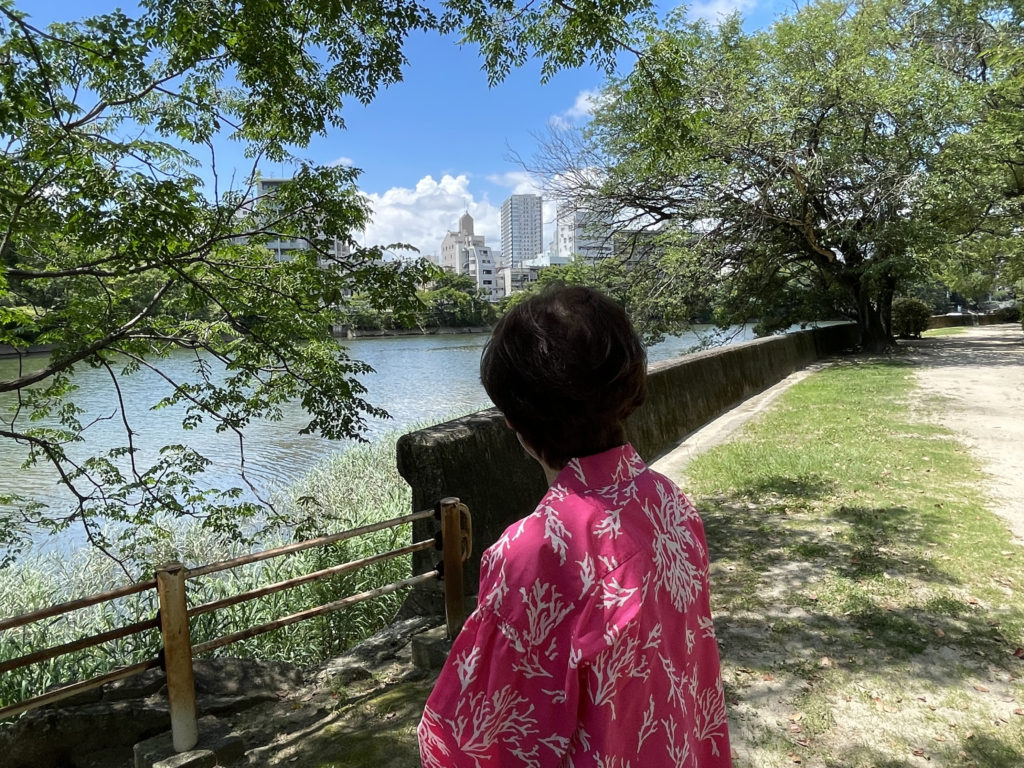
“The sky was this blue that day…”
It was the 78th summer since then. I was walking with my grandmother along the riverbank in the once-bombed town of Osuga-cho when she told me her story.
She shared the abominable memories still deeply and vividly etched in her mind like they only happened yesterday.
Osuga-cho has completely changed since then, but the summer sky over Hiroshima was still the same as on that day.
Softball — The Savior of My Grandmother’s Heart
Hiroshima summers like this also make my grandmother recall her memories of chasing softballs under the sun as a famous player in the Showa period.
My grandmother’s burns had faded. No one could tell she even had them if she didn’t say so. She also had the glass shards buried in her back for 42 years removed.
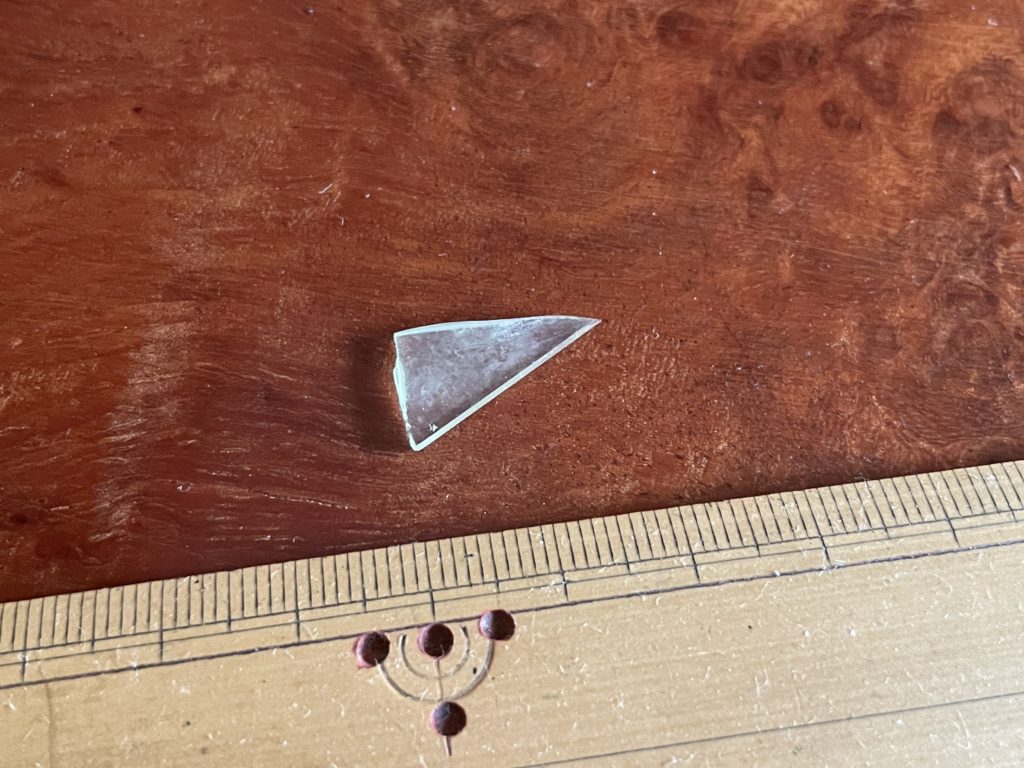
However, some wounds cannot be healed by time alone.
After the tragedy, a rumor spread in Hiroshima, discouraging people from marrying women exposed to the bomb. It was even worse for my grandmother, who had keloids. She would have to give up more things in life.
My grandmother was downing in despair, but softball saved her heart.
There was this one teacher named Yasuda Minoru at Yasuda Girls’ High School (now Yasuda Girls’ Junior and Senior High School), where my grandmother attended. In postwar Hiroshima, he founded a softball club with a strong conviction that the school couldn’t be rebuilt unless its students, who had lost everything in the tragedy, could find something to give them hope. This is what made my grandmother play softball.
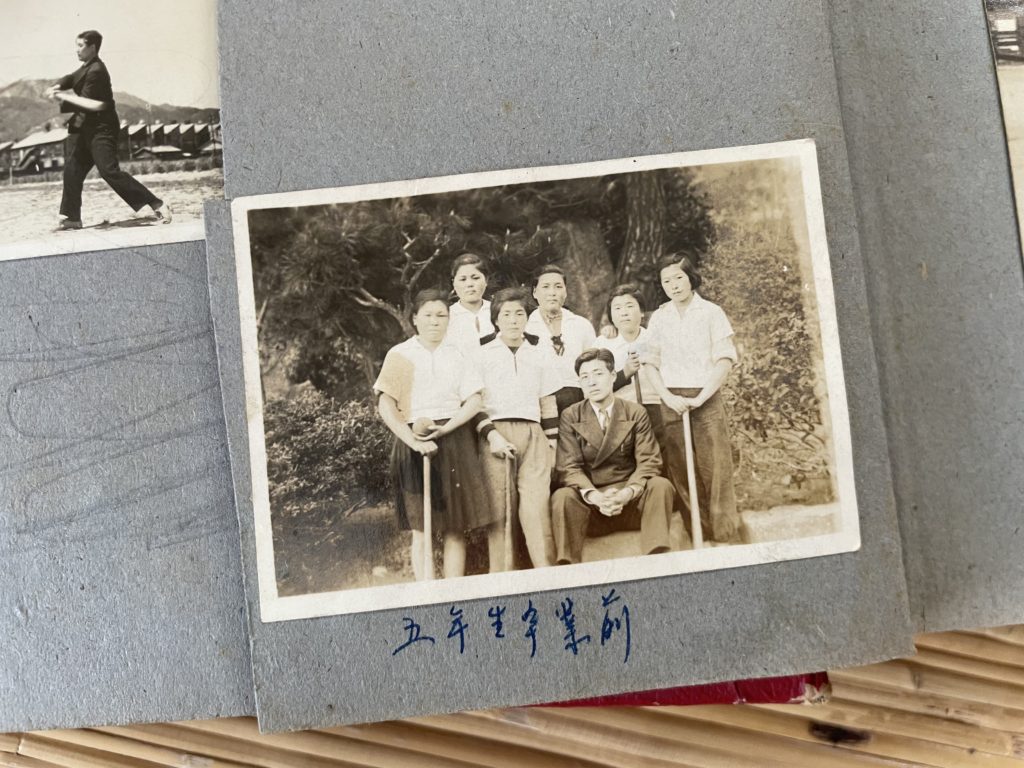
My grandmother trained her body and soul, devoting herself to softball despite her horrible memories of the burnt Hiroshima and the severe wounds she suffered. She also became the captain and was her club’s #4, playing a key role in the team.
Even so, people ridiculed her for playing sports despite being a woman. Many of her teammates’ parents were also against the idea. Because of this, they couldn’t practice often.
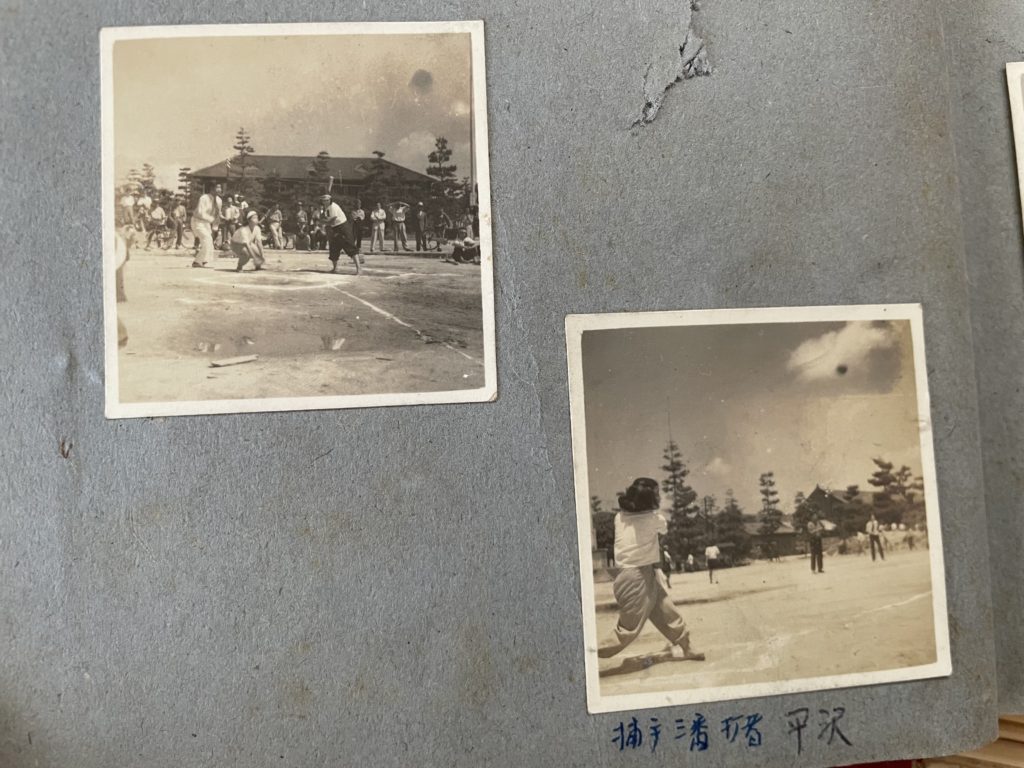
How and why did my grandmother and her peers devote themselves to softball despite all the opposition?
She thought giving up was all she could do. However, sports reignited her will to live. She wanted to see her hard work through sports bear fruit.
She was covered in scrapes every day, chasing white balls with her bare hands. She didn’t have the proper equipment, only her work pants. Nevertheless, they won their first championship in the first-ever softball tournament held in Hiroshima Prefecture. My grandmother reached the home field and secured the winning score.
Playing softball was the only thing that could make her forget about the atomic bombing.
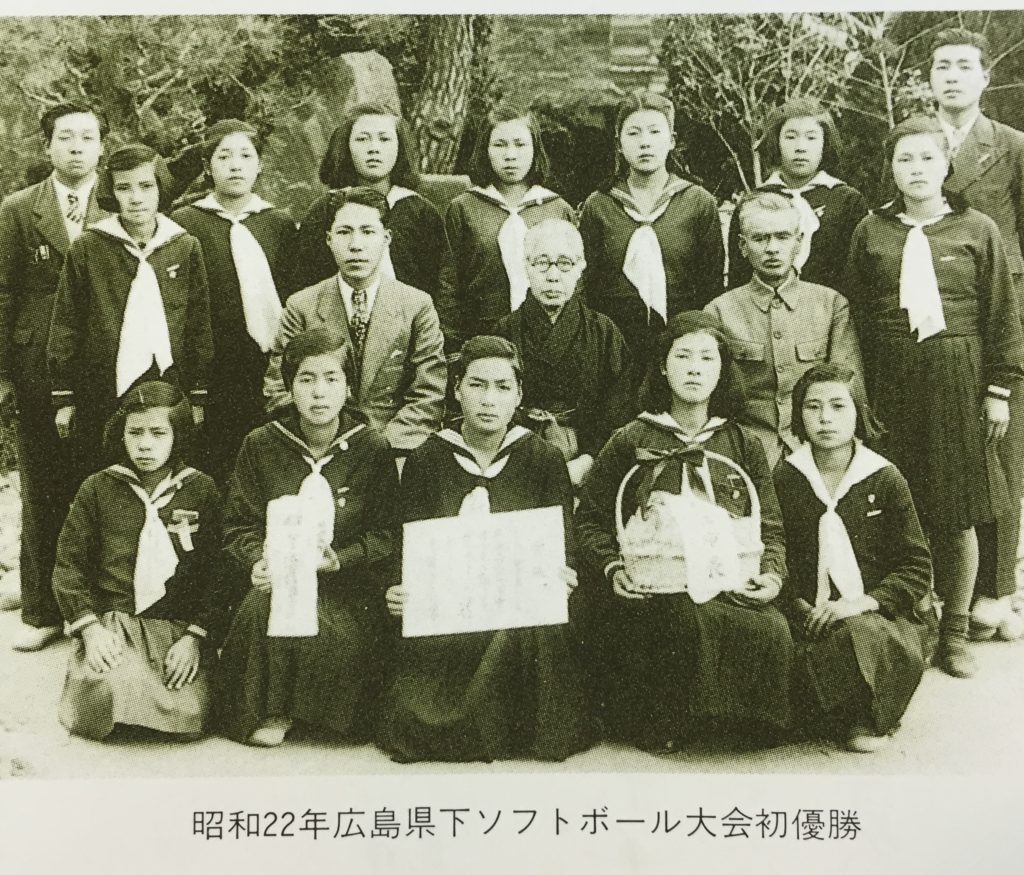
The times, circumstances, and everything else was completely different from ours. It may be difficult to comprehend even one percent of what she went through. Still, I listened. She convinced me that no barrier was unsurpassable.
My grandmother was later invited to join an adult softball team but refused due to her parents’ opposition. She married my grandfather at 21. Even after she married and had children, she always watched baseball games with my grandfather. Her knowledge from playing softball and my grandfather’s love for watching baseball games made them avid Carp fans.
My grandfather took my father to the ballpark, and then my father, in turn, took me there. That is how some things have been handed down from generation to generation.
Baseball and Peace
My grandmother often told me stories about Hasegawa Ryohei, the “Little Great Pitcher.” Even now that my grandfather has passed away, I still hear the sound of baseball from my grandmother’s room.
Hearing that sound, I could feel the bond baseball created still connected to me.
Baseball and Peace—these two seemingly distant entities are inseparable and heavily linked in my mind.
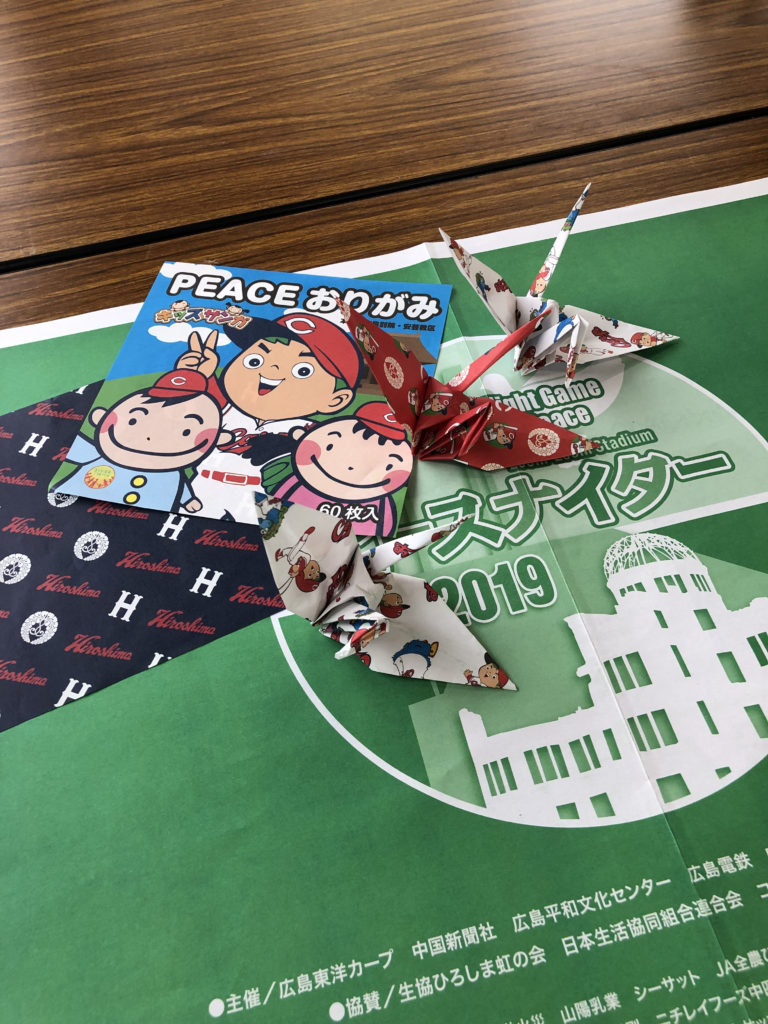
Now in its 16th year, Peace night game is an event to pray for peace and nuclear abolition.
The Carps’ home field had actually not seen an official game on August 6th for a long time, with the 1958 season being the last. Kurihara Kenta’s blog broke this silence, leading to an official game on August 6th, 2011, in Hiroshima—the first in 53 years. Kurihara was a mainstay of the Carps and is now coaching the Chiba Lotte Marines as their second hitting coach.
He is a native of Yamagata who married a woman from Hiroshima after joining the Carps and has been conscious of A-Bomb Day ever since. He questioned Hiroshima City’s regulations that declared the stadium “closed” on August 6th, asserting that it hindered people from choosing Hiroshima as a destination for sports tours and travel on that special day.
He poured every effort into conveying his thoughts and feelings as someone who came to Hiroshima from a different prefecture, sharing a perspective that people from within couldn’t notice.
His blog posts moved many people and bore fruit as Peace night game, which continues to this day.
The Japanese flag was raised at half-staff at the stadium, marking the 70th anniversary of the war’s end. Everyone was silent, with all the Carps having a white dove on their hats, symbolizing peace. And for the first time in the Central League, all players wore the uniform number “86” for the game.
This match is more than just a game held on the day of the atomic bombing. The Carps were a beacon of hope that supported Hiroshima’s post-war recovery. They were and will always be.
I am grateful to the Carps, a team built on these thoughts, and for the peace that allows us to enjoy baseball. I look forward to the moment that ignites hope once again this year and in the years to come.
Today is another day I chase the white ball.
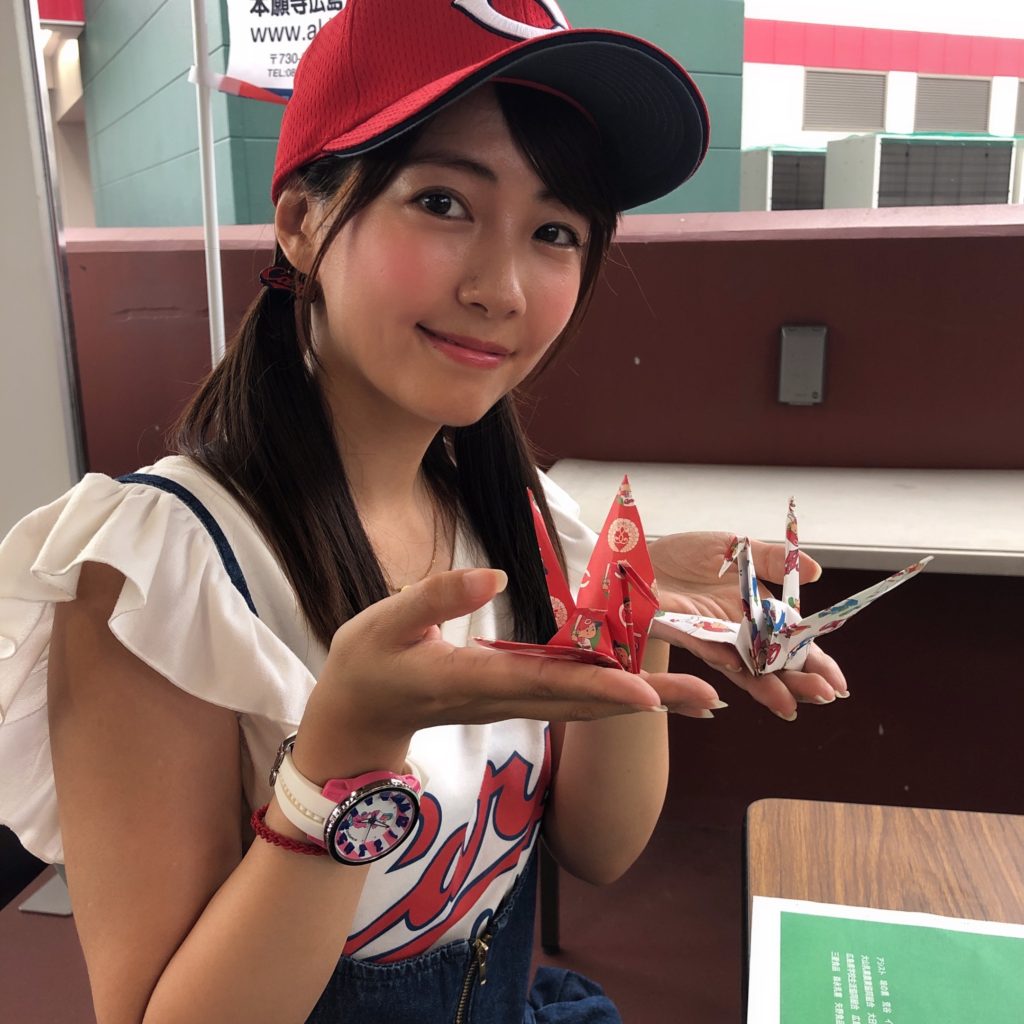
Profile
Uemura Chika
Uemura Chika was born and raised in Hiroshima. She is active in many fields in Hiroshima, including TV and radio. In 2016, she won the “Red Fashionista Award 2016” sponsored by Wacoal as a representative of Carp Girls in the sports category. Uemura was an official supporter of the 1st Hiroshima International Peace Culture Festival in 2022. She is also the MC of RCC Radio’s “Uemura Chika no Koisuru Kikakushitsu,” the anchor for Hiroshima TV’s “ZIP” and a commentator for Hiroshima Home Television’s “Pita New.”
Tags associated with this article



